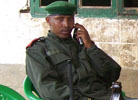
GOMA, Democratic Republic of Congo — Thomas Lubanga, the former leader of the Union of Congolese Patriots, or UPC, was convicted by the International Criminal Court last week for the conscription and use of child soldiers during the Ituri civil war from 2002 to 2003 in Congo’s Orientale province. Lubanga was first arrested and jailed in the Makala prison in Kinshasa in March 2005 before he was transferred to The Hague a year later. The three-year long trial—the ICC’s first—garnered attention in eastern Congo not only because the region was the scene of Lubanga’s crimes but also because there are a handful of other rebel leaders who should face a similar fate.
Rebel leader-turned-Congolese army commander Bosco Ntaganda tops that list. In its verdict, ICC judges recognized the connection between Lubanga and Ntaganda during the Ituri civil war, when Ntaganda served as Lubanga’s third in command. Ostensibly an inter-ethnic war between the Hema and Lendu, “The war was actually designed to have control over rich mining areas in Ituri,” Olivier Mandro, an Ituri-born lawyer, told the Enough Project. After the Ituri conflict, Ntaganda went on to form his own militia before joining the National Congress for the Defense of the People, known by its French acronymn CNDP. Taking advantage of a peace deal secretly negotiated between President Joseph Kabila and Rwandan President Paul Kagame, Ntaganda was integrated into the Democratic Republic of Congo’s armed forces, where he has been a commander for the past three years.
Today, Ntaganda remains known as a kingpin of minerals smuggling in the region and commander of attacks against civilians. The ICC issued a warrant for Bosco’s arrest in 2008 for conscription of child soldiers in 2002—similar to the charges brought against Lubanga. According to Radio Okapi, the ICC prosecutor has promised to broaden the charges against Ntaganda in the future for continued massacres and rapes in the Kivus.
Although the conviction of Thomas Lubanga is a “victory for humanity,” as described by ICC Prosecutor Luis Moreno-Ocampo, in North Kivu and elsewhere in the DRC, the news has largely remained a non-event. People are skeptical about whether President Kabila’s speeches about cracking down on impunity are anything more than lip-service, intended to appease the international community. In practice Kabila’s government pursues far more convincingly a policy of rewarding some of the most heinous criminals with promotions and positions if it serves the interests of the president and his entourage. The Congolese government was quick to churn out its rhetoric on the verdict. Justice and Human Rights Minister Luzolo Bambi told reporters at a press briefing last Wednesday, the day of the Lubanga verdict, "The DRC notes the decision of the ICC; the DRC renews its full cooperation with this ICC institution, and confirms its commitment to fight against impunity in all its forms … " Conspiculously, the minister made no mention of the Congolese government’s role in pursuing justice for those Congolese military leaders still wanted by the ICC for war crimes.
In Goma, where Ntaganda still commands much of the region’s military operations, people did not know what to say to the news of the Lubanga verdict. Sebastian Bony, an assistant professor at Goma’s High Institute for Rural Development, said that while the verdict seems to be politically motivated, given that Lubanga is said to be a “co-author” of the crimes and yet remains the only person behind bars in The Hague, the conviction is a positive step. “The verdict is a sign of hope that no matter how long criminals can be protected under the DRC’s current ruling power, the international community’s justice will eventually pick them up,” Bony told the Enough Project.
Civil society representatives in Kinshasa pointed out the government’s inconsistent handling of these two men wanted for war crimes in Ituri and called for Kinshasa to finally apprehend Ntaganda. At a press conference on Friday, Benoît Idolo of the National Council of Civil Society Organizations faulted the government for not arresting Ntaganda, an accomplise of the man just found guilty of recruiting child soldiers. “Besides, he has been charged with huge responsibilities in the national army as the military coordinator of the operation called ‘Amani Leo’ in Walikale District, eastern DRC,” said Idolo, according to a report in Kenya's Daily Nation.
For many, as long as Ntaganda is allowed to freely walk the streets as a high-ranking commander in the Congolese army, President Kabila is denying the people true justice. In Ituri, there was another reaction. Lubanga's supporters demonstrated outside the headquarters of his party protesting against the verdict. Some threatened to take up arms until they were eventually calmed down by Member of Parliament John Tinanzabo, who represents Irumu region of Orientale province and serves as acting president of the UPC, the party of Thomas Lubanga.
But Bosco knows well that having become the embodiment of corruption and violence in Congo, he is on the radar of the international community. According to a colonel in the Congolese army who preferred to remain anonymous told Enough:
It is for fear of deportation that General Bosco opposes any deployment outside of the Kivus, and as a precaution, refuses to travel by boat or plane. He’s always escorted by about thirty heavily armed loyalist elements ready to pay with their blood to protect a person they call ‘Afande,’ Kiswahili for Master. Bosco has sworn he will never be dragged alive before The Hague’s bar.
The conviction of Thomas Lubanga is certainly a victory for humanity, but in face of Kabila’s and Kagame’s willingness to protect and promote criminals like General Bosco Ntganda, we see that international justice by the ICC has a long way to go to counter views of the views of most eastern Congolese who who believe there is only justice for the weak.

